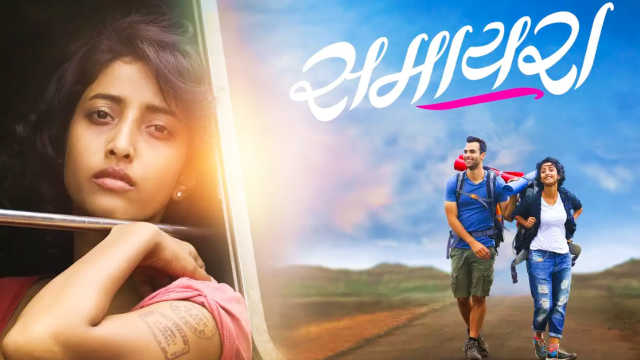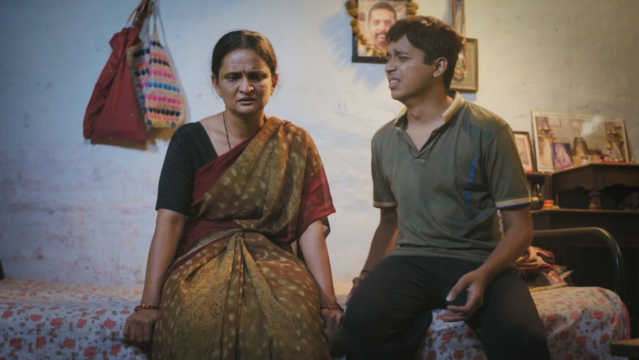
Sonal Pandya
Mumbai, 31 Oct 2018 7:00 IST
Writer-director Bhimrao Mude's feature puts up an intriguing concept, but its execution is poorly handled.

In the small Maharashtrian village of Dhanor, attendance is low at the village school. Newly arrived teacher Asha Deshpande (Anjali Patil), filled with hope and promise for her position, seeks to rectify that statistic. The daughter of a renowned educator, Asha feels pressure to make an impact.
Life is tough in the spartan village. Every family and its children work for a living. To arrive at Dhanor, residents and visitors have to cross a precarious walk-in bridge. A mighty river surrounded by jagged rocks gushes beneath. The villagers long for a stable, sturdy bridge that will ease their lives but make do with what they have in the meantime.
Dhanor's most infamous resident is Utpal Rao aka Theory (Makarand Deshpande), who resembles Albert Einstein with his shock of white hair and mutterings about theoretical physics to the bewildered villagers. Coincidentally, he is the first person Asha meets on her way to Dhanor and he shapes the way she handles her ambitions for the school and its children.
Theory was the first villager to graduate from college and was on the path to attain a doctorate when his father died, leaving his mother bedridden and helpless. He had no choice but to return home, to repay the debt his father took for his education and help out his mother. These days though, while working at the local mill, he is consumed by a pet theory of his own — that of dreams relativity.
Asha once had dreams of her own. She dreamt of representing India at the Olympics as a relay runner and often has daydreams and nightmares involving her running towards a goal. She seizes upon a local inter-school competition to shake up the village and selects two young cousins, Babu and Pintya (Rupesh Bane), to represent them at a swimming competition.
The trouble is their harsh father Sakharam Chowgule (Ashok Samarth), who needs them to man his small kirana (grocery) business and not fuss with a school education or tournaments. Both boys are keen swimmers and want to participate in the contest. Eventually, after much wringing of arms, Sakharam does agree and Pintya manages to win the gold medal at the district competition.
Sakharam is disappointed to learn, however, that the medal is not real gold and pulls the boys out from the competition. His actions set off a chain of events, with Theory intoning that grief will follow the joy the entire village has experienced. And it does. It sets them on a path of redemption and, eventually, leads to success, but they endure much suffering along the way.
If the plot of Bardo sounds complicated, it is! The film's title refers to 'bardo', the state of existence between death and rebirth. Theory believes everything and everyone experiences this. The film is dedicated to Einstein and his theory of general relativity, from which it is inspired.
Bhimrao Mude and co-writer Shweta Pendse (who also acts as village woman Nakusa in the film) must have had an ambitious concept in mind when scripting it, relating the dreams of a village to its progress, but the execution leaves a lot to be desired.
The film has been co-produced by music composers Rohan Gokhale and Rohan Pradhan who also provide the score for this production.
While Theory is a compelling character, the others who inhabit the film are not. Patil's Asha is often a confused, unsure character, looking for clarity from others, especially Theory. I never felt her authority as a strong teacher, though she tries to encourage both Babu and Pintya.
The rest of the villagers, from Babu's mother to Nakusa, seem like caricatures. The acting in the film is quite loud, the emotions heightened and dramatized to make a point. It need not have been that way. It veers more often that not towards overacting.
Furthermore, the editing of Bardo, emphasizing the reaction of every character in every scene, was amateurish, reminding you of Indian television series. On paper, this theory might have looked promising, but I daresay the calculations needed a bit more work.
Bardo was screened at the 20th Mumbai Film Festival on 28 October 2018.
Related topics
MAMIYou might also like

Review Marathi
Samaira review: This well-intentioned travel drama suffers from a dull script
Actor Rishi Deshpande's directorial debut doesn't rise as much as its performances. ...

Review Marathi
Goshta Arjunchi review: Triggering conversations about mental health
Anupam Barve’s short film urges people to talk to their families about what they are going...

Review Marathi
Ekda Kaay Zala review: Sumeet Raghvan impresses in a film that does not use its full potential
Directed by Dr Saleel Kulkarni, the film has a fine act by child artiste Arjun Purnapatre....

